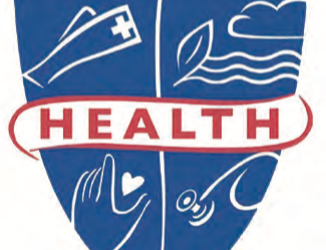by Kate Evans
Health officials continue to worry about an onslaught of respiratory illnesses – COVID-19, seasonal influenza and RSV (respiratory syncytial virus) – during this holiday season. There has been a wave of respiratory illness in West Virginia, Maryland and nationwide.
Health officials have continued to urge everyone to get an updated COVID-19 booster shot and their annual seasonal influenza vaccine now. Pneumonia vaccines are also recommended for children and adults of all ages.
Health departments tracking
Maryland Health Department officials said the state had seen an early surge of severe respiratory illness in very young and school-age children.
Morgan County/Berkeley County Health Department Health Officer Dr. Kevin McLaughlin said that flu is starting to surge here. Healthcare providers are also seeing plenty of RSV cases in kids along with COVID. Most flu cases are Influenza A, which is causing a lot of body aches, sore throats and high fevers of 103 and 104 degrees.
The area has low vaccination rates, but those who have gotten their flu vaccine are not getting this round of Influenza A, McLaughlin noted.
McLaughlin said the prevention precautions for flu and RSV are the same as for COVID-19. He said to be smart. If you are have a fever, a nasty cough and cold and are sneezing with typical flu symptoms, you should stay home and stay away from public areas and other people.
Rest, drinking lots of fluids and taking Vitamin C, D and zinc should help recovery, he said.
Hospital cases
War Memorial Hospital Emergency Room Manager Chris Parsons said that their COVID-19 numbers had remained steady but flu and RSV case numbers had increased a great deal.
In November, the emergency room had seen over 80 flu cases and more than 30 RSV cases in adults and in children. COVID cases remained around the same at 30 cases.
Parsons said she couldn’t stress enough the importance of getting a flu shot.
Seasonal flu activity began early and continues to increase across the United States with the majority of states reporting high levels of flu activity. The majority of flu cases have been Influenza A.
Virginia and Maryland are both currently experiencing very high influenza-like illness (ILI) activity while Pennsylvania’ s levels are considered high. West Virginia is showing moderate ILI activity. ILI is respiratory illness that includes fever plus a cough or sore throat.
The Centers for Disease Control and Prevention (CDC) estimates that there have been at least 13 million illnesses, 120,000 hospitalizations, and 7,300 deaths from flu so far this season.
There have been 21 pediatric deaths from influenza so far nationwide with the first pediatric death in West Virginia occurring on November 11.
COVID
Morgan County is currently at a low level for COVID-19 infection. The county had 12 new COVID cases and seven active COVID cases as of Monday, December 12.
To date Morgan County has seen 4,273 confirmed COVID-19 cases and 757 probable cases – a total of 5,030 COVID cases.
Some 4,947 individuals have recovered from COVID-19. In Morgan County, 76 resident deaths have been attributed to COVID-19.
Morgan County has 33.8% of its population fully vaccinated from COVID-19.
Washington County has had a total of 608 resident deaths due to COVID-19 and 40,009 confirmed COVID cases as of December 12. Washington County has 61.8% of its population fully vaccinated.
RSV
Cases of Respiratory syncytial virus (known as RSV) have been diminishing nationwide after a number of outbreaks. Symptoms of RSV infection include runny nose, decrease in appetite, coughing, sneezing, fever and wheezing.
Individuals are generally infected with RSV as an infant or toddler and almost every child will have had an RSV infection by their second birthday, said CDC officials. People of any age can be infected.
Treatment involves over the counter fever reducers like acetaminophen and ibuprofen (don’t give children aspirin) and drinking plenty of fluids to avoid dehydration.
RSV is the leading cause of pneumonia and bronchiolitis in children younger than one year old, according to the CDC. Some older adults and infants younger than six months may need hospitalization if they are having trouble breathing or are dehydrated.
Emergency symptoms
Dr. Jose Romero, Director of the CDC National Center for Immunization and Respiratory Diseases, said in a November 4 media briefing that emergency warning signs to watch for in children and young infants include fast breathing or trouble breathing, blue lips, face/chest pain, muscle pain, (child refuses to walk or cries excessively when picked up), dehydration shown by no urine over an eight-hour period, a dry mouth, crying without tears and a child that isn’t alert or interactive when awake.
If your child is experiencing any of these warning signs, seek medical attention immediately, Romero said.
Prevention
Preventing RSV , flu and COVID-19 involves the same measures, say healthcare providers.
—Cover your coughs and sneezes with a tissue or your upper shirt sleeve-not your hands.
—Wash your hands often with soap and water for at least 20 seconds.
—Stay home if you or your child are sick, except to get medical care.
—Don’t send a sick child to school or daycare.
—Avoid close contact with others, such as kissing, shaking hands and sharing cups and eating utensils.
—Clean frequently touched surfaces such as doorknobs, telephones, counter-tops, cell phones and keyboards.
—Consider wearing a face mask, especially if you develop a runny nose, cough or fever.
—Stay up to date on your vaccinations. Get the yearly influenza vaccine and the updated COVID booster vaccine to ensure that you and your family are protected during the holidays.




